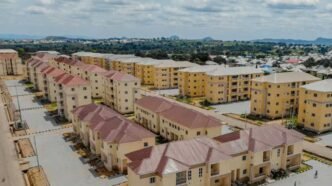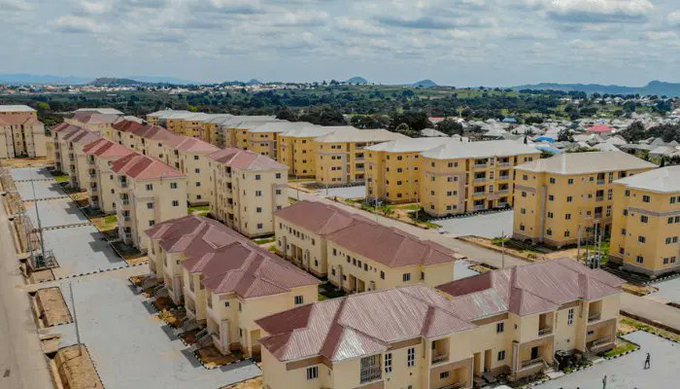ABUJA, Nigeria — October 27, 2025
The Federal Government has approved uniform selling prices for housing units under the Renewed Hope Housing Scheme, a landmark step in President Bola Tinubu’s effort to provide affordable housing and reduce Nigeria’s housing deficit.
According to the Federal Ministry of Housing and Urban Development, the newly approved prices will apply nationwide to ensure transparency and fairness in the sale of Renewed Hope Housing Estate units.
Approved Prices for Renewed Hope Housing Units
The Ministry disclosed the following official prices:
- 🏠 One-bedroom semi-detached bungalow: ₦8.5 million
- 🏡 Two-bedroom semi-detached bungalow: ₦11.5 million
- 🏘️ Three-bedroom semi-detached bungalow: ₦12.5 million
The pricing structure, the Ministry said, reflects affordability while maintaining quality standards for sustainable housing delivery.
Tinubu’s Renewed Hope Agenda and Housing for All
The Renewed Hope Housing Programme is a flagship initiative of the Tinubu administration aimed at tackling Nigeria’s long-standing housing crisis — estimated at over 20 million units — while stimulating local economies and job creation.
Announcing the development in Abuja, Minister of Housing and Urban Development, Arc. Ahmed Musa Dangiwa, said the uniform pricing model ensures equal access for all Nigerians, irrespective of state or region.
“The Renewed Hope Housing Scheme is about fairness and inclusivity,” Dangiwa said. “This uniform pricing structure eliminates regional disparities and ensures every Nigerian has a chance to own a decent home.”
He emphasized that the Federal Government’s goal is to make home ownership possible for ordinary Nigerians — including civil servants, artisans, small business owners, and first-time buyers — through affordable pricing and flexible payment plans.
How the Renewed Hope Housing Scheme Works
The scheme is being implemented through a public-private partnership involving state governments, local developers, and mortgage institutions.
Buyers can either:
- Pay outright, or
- Access mortgage facilities through the Federal Mortgage Bank of Nigeria (FMBN) and other financial partners.
According to the Ministry, the approved uniform prices will serve as a national benchmark, preventing arbitrary price increases and promoting transparency across all states.
To enhance accountability, the government is also developing a digital housing application portal, where prospective buyers can register, apply, and monitor their applications.
“Every Nigerian will have a fair chance,” Dangiwa assured. “The process will be digital, transparent, and efficient.”
Economic Impact and Job Creation
The Renewed Hope Housing Scheme is designed not only to bridge the housing gap but also to create thousands of jobs across Nigeria’s construction value chain.
Each housing site is expected to engage local artisans, engineers, suppliers, and transporters, thereby boosting employment and supporting President Tinubu’s broader economic reforms.
A senior housing policy expert, Dr. Joseph Nwosu, praised the initiative, calling it “a practical and inclusive approach to national development.”
“Affordable housing drives both economic and social stability,” Nwosu explained. “By approving uniform prices, the government has taken a realistic step toward improving citizens’ quality of life.”
Public Reaction and Expectations
The announcement has generated excitement among Nigerians, especially middle- and low-income earners.
Mrs. Kemi Adediran, a teacher based in Abuja, welcomed the pricing decision.
“This gives hope to many of us who have dreamed of owning a home but couldn’t afford private developers’ rates,” she said. “If implemented transparently, this could change lives.”
However, some Nigerians urged the government to ensure fair distribution and prioritize genuine home seekers over politically connected individuals.
Transparency and Accountability Measures
The Ministry of Housing emphasized that the allocation process will be monitored closely to prevent manipulation. A central online system will be launched to track:
- The number of available units,
- Applicant categories, and
- Payment and allocation history.
This digital approach aims to eliminate corruption and favoritism, which have plagued past public housing projects.
Nigeria’s Housing Deficit and the Renewed Hope Vision
Nigeria’s housing deficit, currently estimated between 17–22 million units, continues to pose a major social challenge.
The Renewed Hope Housing Programme is projected to deliver 100,000 housing units annually, depending on funding and partnerships with state governments and private developers.
By offering one-bedroom units at ₦8.5 million and three-bedroom units at ₦12.5 million, the scheme aims to make home ownership realistic for average Nigerians earning modest incomes.
“With these price points, the Renewed Hope agenda is turning aspiration into reality,” said an industry analyst. “For the first time in years, government-built housing is priced within reach of the working class.”
Conclusion
The Federal Government’s approval of uniform sale prices for Renewed Hope Housing Estate units is a decisive step toward achieving inclusive home ownership in Nigeria.
By pegging prices at ₦8.5 million, ₦11.5 million, and ₦12.5 million respectively, the administration is showing strong intent to make affordable housing a tangible part of its Renewed Hope Agenda.
As construction and allocations progress nationwide, the success of this initiative will depend on transparent execution, sustained funding, and continuous stakeholder collaboration.
For millions of Nigerians still dreaming of owning a home, this announcement brings real hope — and a clear path — to turning that dream into reality.














